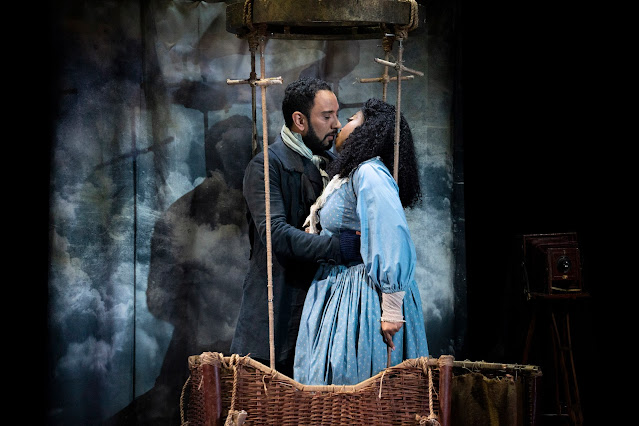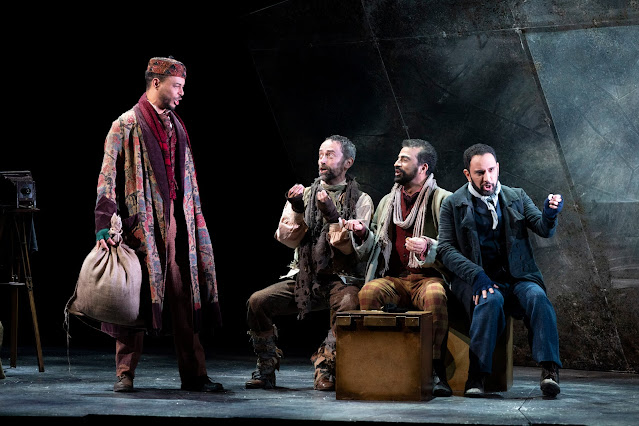 |
| Puccini: La Boheme - Michel de Souza, April Koyejo-Audiger, Francesca Chiejina, Luciano Botelho - English Touring Opera (Photo Richard Hubert Smith) |
Puccini La Boheme; Francesca Chiejina, Luciano Botelho, April Koyejo-Audiger, Michel de Souza, Trevor Eliot Bowes, Themba Mvula, dir: Christopher Moon-Little/James Conways, cond: Dionysis Grammenos; English Touring Opera at the Hackney Empire
Reviewed by Robert Hugill on 26 February 2022 Star rating: (★★★★½)
Intelligent, well thought out, engaging, and moving, ETO revival of their 2015 production show Puccini's opera can engage both those new to the opera and those for whom the work is very familiar
English Touring Opera's Spring season opened at the Hackney Empire on Saturday 26 February 2022 with a revival directed by Christopher Moon-Little of James Conway's 2015 production of Puccini's La Boheme, Dionysis Grammenos conducted with Francesca Chiejina as Mimi, Luciano Botelho as Rodolfo, Michel de Souza as Marcello, Trevor Eliot Bowes as Colline, Themba Mvula as Schaunard and April Koyejo-Audiger as Musetta. Designs were originally by Florence de Mare, revival designer Neil Irish. Bryan Higgins' edition for chamber orchestra was used.
For all it's tear-jerker reputation (and let's face it, no production of La Boheme is a complete success unless Mimi's death scene brings a tear), Puccini's first runaway success is a surprisingly complex and multi-layered piece. First there is Puccini's sophisticated use of the orchestra, taking from Massenet the use of orchestral motifs to help tell the story and provide extra background. Then there is a question of who these students are. The opera is based on Henri Murger's stories (stories that spawned a play and a novel), based on his own life, about life in bohemian Paris, documenting the students and artists, many of whom were not necessarily genuinely down on the uppers but simply part of the Bohemian movement. Yet some of the details in Acts 1 and 3 relate directly to Puccini's time as an impoverished student studying in Milan. But, whilst in Milan, he came into contact with a group of older artists and composers who had been part of the Scapigliatura (the shoeless ones) movement, the post Risorgimento artistic movement that was Italy's equivalent of Bohemianism. So there is plenty to go at there, and each director makes their own choices.
 |
| Puccini: La Boheme - Luciano Botelho, Francesca Chiejina - English Touring Opera (Photo Richard Hubert Smith) |
The revival director, Christopher Moon-Little contributed a fine article in the programme book exploring the history of the grisette, not only introducing me to the word civette (literally little owl), but pointing out the two female characters are known, throughout the opera by their nicknames, 'Sweetie' and 'Bagpipe', something that can easily pass us by in the welter of hummable tunes and lively stage detail.
For the production, costumes were firmly in period and realistic, but though the sets evoked a garret in the roof, a bar on the Left Bank and another liminal space, they were not realistic. The main piece of the set, a large sheet of transparent material, was used to reflect, refract and obscure, being the window in the attic, having the name Momus drawn on it (in reverse), and giving us a similar reverse view of the inn sign in Act Three, then at the very end a subtle evocation of blood spatter. In a fascinating article in the programme book, Conway talked about the desire to create a production that evoked memory and dream. There was no attempt to fill in the detailed back story of these characters (unlike Jonathan Miller's highly detailed production at ENO), instead we had four strongly etched scenes, 'four brief scenes of shared youth'.
The set had a constricting effect which created a series of intimate, yet evocative spaces, and the whole production relied on the way the performers peopled the space. It perhaps helps that the whole cast was young, and there was a strong vein of emotional truth running through the performance. The result was one of the most satisfying accounts of the opera that I have seen in a long time, not reliant on star performances but on the interaction of a group of friends.
 |
| Puccini: La Boheme - Themba Mvula, Trevor Eliot Bowes, Michel de Souza, Luciano Botelho - English Touring Opera (Photo Richard Hubert Smith) |
Francesca Chiejina, making her role debut as Mimi, combined a lovely warm, creamy vocal tone with a sense of reticence but also self-possession. In Act One, she allowed Luciano Botelho's Rodolfo to make the running, but it was a deliberate decision. Their concluding sequence in that act (his aria, her aria, the duet) was beautifully sung, yet also felt quite naturally believable, heightened conversation as it should be. Botelho made a stylish Rodolfo, believable both as a poet and as a lover. We have seen Botelho previously with ETO in Rossini and there we moments when you felt him pushing his voice to deliver the stirring lines that Puccini gives Rodolfo, but his singing was always musical and there were some haunting quieter moments. In Act Two, during all the pandemonium, Botelho and Chiejina's contributions counted for rather more than is often the case, keeping their characters in our minds. Act Three was finely done indeed; no need to recalibrate after the fun of the first two acts, their duet seemed to come out of the earlier material. And led, of course, to the death scene. And yes, it did succeed.
The other three men formed a strong bond with Botelho's Rodolfo, the hijinks was fun and believable without being embarrassing. For all the dreamscape idea, there was plenty of telling detail and the way the four singers, Botelho, Michel de Souza, Trevor Eliot Bowes and Themba Mvula interacted was engaging. De Souza managed to balance seriousness and comedy in his portrayal of Marcello, making the man's pain believable even when relations with April Koyejo-Audiger's Musetta were hilarious. Mvula and Eliot Bowes completed the quartet in fine manner, both making significant contributions without pulling focus. Eliot Bowes gave a finely subtle account of his Act Four farewell to his overcoat, but again it was part of the natural ebb and flow with no sense of here's my famous aria. And was it my imagination, or was there a suggestion of a relationship between the two, and giving one TB as well was a nice touch.
April Koyejo-Audiger was a poised and knowing Musetta, beautifully sung yet always with the suggestion that this Musetta's life was carefully crafted. Her Act Two aria and Marcello's subsequent taking up of the music has always been one of my favourite points in the the opera, and it didn't disappoint here. In Act Three, both Koyejo-Audiger and de Souza made superb foils for the lead couple, yet established themselves too.
The remaining cast were all strongly taken by members of the ensemble (some of whom are covering roles, and Jerome Knows from the ensemble sings Marcello at some performances). Matthew McKinney made an amusing Benoit without resorting to the sort of extreme characterisation that often besets this character. Robert Lewis popped up delightfully as Parpignol (here a puppeteer), and we will be seeing more of Lewis next week as he is sings the high tenor role of the Astrologer in Rimsky Korsakov's The Golden Cockerel. Phil Wilcox was Alcindoro, again not too caricatured, with Aidan Edwards making a strong presence as a policemen.
The chorus in Act Two successfully peopled what could have been a slightly sparse set, and brought the whole scene alive without ever taking attention away from the principals. This was never a show about the background detail, but it was there and the chorus was finely sung. There was a children's chorus too. In each venue, a local children's chorus is being used, an example of the way ETO's community programme intertwines with its main stage productions. Here it was the Hackney Children's Choir, lusty singing and patent enjoyment.
In the pit, Dionysis Grammenos relished his slimmed down forces (15 strings but single woodwind, and two clarinets, plus horns, trumpet, trombone, harp percussion) and gave us a lithe and engaging account of the score. Grammenos zipped along, and the dialogued flowed beautifully. This was very much Puccini as heightened dialogue, rather than a series of set piece arias, and it worked very well indeed.
 |
| Puccini: La Boheme - Act Two - English Touring Opera (Photo Richard Hubert Smith) |
The young woman sitting next to us had never been to the opera before, and the production drew her in quite as much as it drew us old stagers in (I first saw the opera in 1979 in Scotland with Alexander Gibson conducting Scottish Opera, with Dennis O'Neill and Isobel Buchanan as the lovers). There are 20 further performances of this production (4 March 2022 in Hackney then on tour until June), a perfect way for those new to opera and regular opera goers to experience one of the delights of the repertoire in an intelligent, well thought out, engaging, and moving performance. From 17 March, some of the performances will have Paula Sides and Thomas Elwin as Mimi and Rodolfo.
Never miss out on future posts by following us
The blog is free, but I'd be delighted if you were to show your appreciation by buying me a coffee.
Elsewhere on this blog
- The Last Castrato: Max Hoehn and Torsten Rasch on their new collaboration as part of Opera21's platform for new opera - interview
- Manhattan to Montmartre: Bernstein and Gershwin transcriptions from Julian Jacobson and Mariko Brown - record review
- The cycle of life: Jamie Manton's new production of Janacek's The Cunning Little Vixen at English National Opera - opera review
- Phantasm completes its survey of all John Jenkins's viol consorts with a disc of his four-part consorts on Linn - record review
- Early Moderns: the (very) first Viennese School from American Baroque ensemble Quicksilver - record review
- Most pieces use the dichotomy between tonality and atonality: I chat to composer Eleanor Alberga about writing music - interview
- Certainly not traditional, but true to the work's spirit and dramaturgy: Edward Dick's production of Bizet's Carmen returns to Opera North with Chrystal E Williams back in the title role - opera review
- Mendelssohn and Schumann from Antonello Manacorda and the Orchestra of the Age of Enlightenment - concert review
- Snapshots of a Romance: Elizabeth Llewellyn and Simon Lepper at Classical Vauxhall - concert review
- Vividly theatrical: Irish National Opera's production of Vivaldi's Bajazet at Covent Garden - opera review
- Devastates & dazzles: Jakub Józef Orlinski, Il Pomo d'Oro & Francesco Corti in rare 18th century arias at Wigmore Hall - concert review
- György Cziffra: Pianist János Balázs on celebrating the great Hungarian's centenary & continuing his artistic legacy - interview
- Home

.jpg)









No comments:
Post a Comment